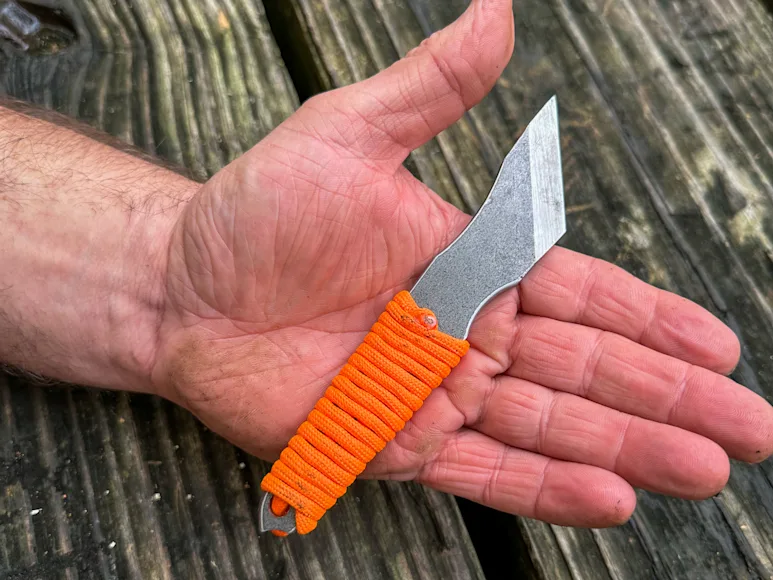I make my living by helping people navigate the wilderness safely, effectively, and with the mindset to handle the unexpected. Whether I'm working with naturalists, trackers, or hardcore survivalists, one piece of gear shows up every time we step into the field: Parachute Cord.
Paracord is an incredibly useful tool in all situations. Once used in World War II parachutes, this tough nylon cord has earned its reputation as an indispensable tool. It’s lightweight, incredibly strong, and endlessly adaptable. If it’s not already in your pack, it should be.
Read Next: The Best Survival Gear
I’ve used p-cord in about every outdoor scenario imaginable—from fixing broken gear in the middle of a multi-day trek, to rigging traps and shelters in survival courses. What makes it even more valuable is how easy it is to carry and how quickly it can be used under pressure. Here are ten smart ways to put parachute to work in the wild.
10 Uses for Parachute Cord
1. Rig a Tarp Shelter

Tie off your ridgeline and corner guylines to create an emergency shelter in any weather. If you need to preserve cordage, then just use the inner strands, not the whole hank. You’ll still have the full outer sheath available for other tasks.
2. Make a Bow Drill String

If you need fire and have the skills, paracord can help you spin up a coal using a bow drill setup. It’s just the right balance of durability and stretch to power through even damp wood if you're determined enough.
Read Next: How to Start a Fire without a Lighter
3. Replace a Broken Bootlace

Better than most factory laces, and it won’t snap when you need it most. The photo here shows a quick field repair, but I recommend replacing your boot strings with paracord straight out of the box. That way, you're ready before things go sideways.
4. Create Snares or Traps

Gut the inner strands to make cordage for small-game snares or trigger systems. The setup pictured is a fishing rig that’s worked well in a pinch, but the same technique applies to land-based trapping for survival food.
5. Build a Fishing Rig

Use the inner strands for improvised fishing line and even fly tying. If you lose your body material but still have the hook, just slide a short piece of p-cord over the shank and fray it to create a passable lure body.
6. Hang a Bear Box

Keep your food high and away from hungry critters. Just remember, don’t let the container rest against the tree trunk. Bears are excellent climbers and giving them a solid surface to reach from is a mistake you’ll only make once.
7. Fix a Zipper Pull

Loop some cord through a busted zipper so you can keep your gear closed and dry or, as shown here, just add it for ease of use. Cold hands or gloves make small pulls tricky. A short length parachute cord and a simple overhand knot solves the problem fast.
8. Make a Rifle Sling

If your rifle sling is forgotten or fails in the field, a few quick knots and some paracord will have you back to carrying your rifle safely and comfortably. It’s a simple fix that can keep your hands free when you need them most.
9. Mark a Point of Interest or Perimeter
I use bright-colored paracord regularly to establish boundaries for man-tracking boxes, naturalist study sites, and similar setups. The cord helps keep others from trampling sensitive areas while also drawing attention to key points in the field.
10. Knife Handle Wrap

If your knife handle gets damaged, or you just want more grip, wrap it in parachute cord using a whipping knot. Not only does it give you better control, but it also ensures you always have a backup supply of cordage within reach.
Final Thoughts on Uses for Parachute Cord
P-cord is one of those rare tools that punches way above its weight. A few feet tucked into a pocket or wrapped around your knife could be the difference between comfort and misery, or in some cases, survival, and disaster. It’s not fancy, and it’s not expensive, but it might just be the most useful piece of gear you’ll carry into the woods.


